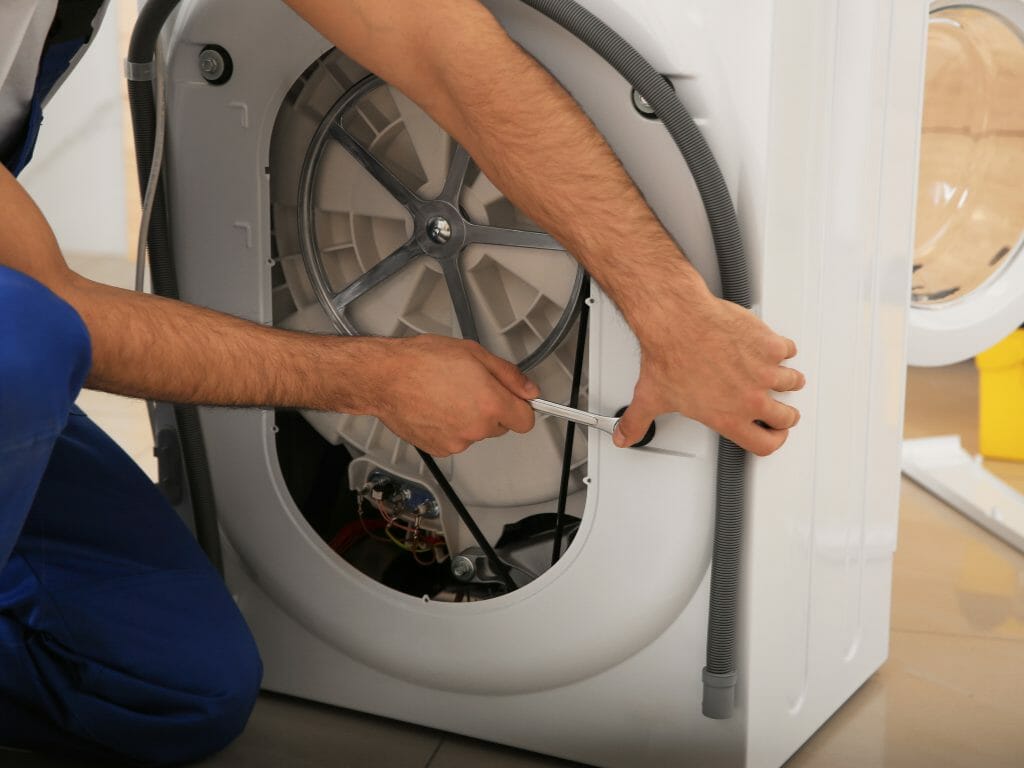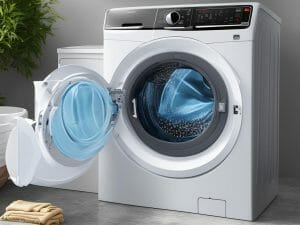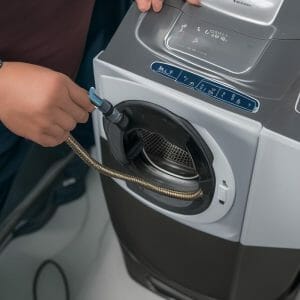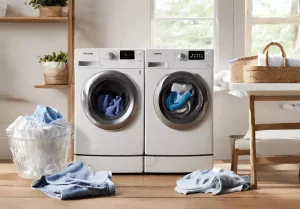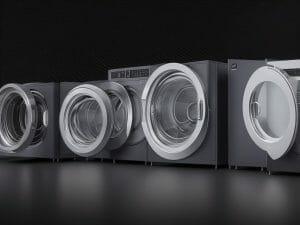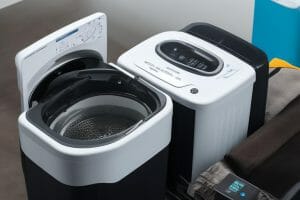Troubleshooting Common Portable Washer Problems
Are you tired of dealing with common portable washer problems? Did you know that 80% of washer issues can be solved with a few simple troubleshooting steps?
In this article, we will guide you through the process of diagnosing and fixing these problems so you can enjoy hassle-free laundry days. From error codes to water leaks, we will cover it all.
So, grab your toolkit, and let’s get started on solving your washer woes!
Error Codes and Their Meanings
If your portable washer is displaying error codes, you can easily identify their meanings and troubleshoot the issue. Error codes are specific numbers or letters that indicate a problem with your washer.
By referring to the user manual or the manufacturer’s website, you can find a list of error codes and their corresponding meanings. For example, an error code E1 might indicate a problem with the water inlet valve, while an error code E2 could suggest a drainage issue.
Once you have identified the error code, you can take appropriate troubleshooting steps. This may involve checking the water supply, cleaning the filter, or ensuring the drain hose is not clogged. Troubleshooting error codes can help you resolve common washer problems and keep your portable washer running smoothly.
Additionally, if your portable washer is experiencing power failures, check the power cord, outlet, and circuit breaker to ensure they are functioning properly.
Leaking Water From the Washer
If you notice water leaking from your washer, there are several key points to consider.
- Check for a loose hose connection, as this can cause water to escape.
- Inspect the washer seal for any damage, as a faulty seal can also lead to leaks.
- Make sure you are not overfilling the washer tub, as this can cause water to overflow.
Loose Hose Connection
Check if the hose connection on your portable washer is loose and tighten it if necessary. A loose hose connection can lead to water leakage and cause various issues with your washer.
Start by locating the hose connection, which is typically located at the back of the washer. Inspect the connection for any signs of looseness or damage. If you notice any, use a wrench or pliers to tighten it securely. Ensure that the connection is tight enough to prevent water from leaking out.
A clogged drain can also affect the water pressure in your portable washer. To check for a clogged drain, remove the drain hose and inspect it for any blockages. If you find any, unclog it using a plumbing snake or by running water through it.
Damaged Washer Seal
Inspect the seal on your washer for any signs of damage, such as cracks or tears, and replace it if necessary. A damaged washer seal can lead to leaks and other issues, so it’s important to address this problem promptly.
Here are some steps to follow for washer seal replacement:
Overfilled Washer Tub
The first step to address an overfilled washer tub is to unplug the machine and turn off the water supply.
To determine the cause of the overfill, you need to check the water level and the drain pump.
Start by inspecting the water level sensor, which is responsible for detecting the appropriate water level during the wash cycle. If the sensor is faulty, it may not accurately detect the water level and cause the tub to overfill.
Next, examine the drain pump for any clogs or blockages. A clogged drain pump can prevent the water from being properly drained, resulting in an overfilled tub. Clear any obstructions and ensure that the drain pump is functioning correctly.
After troubleshooting these components, you can then plug the machine back in and turn on the water supply to see if the issue is resolved.
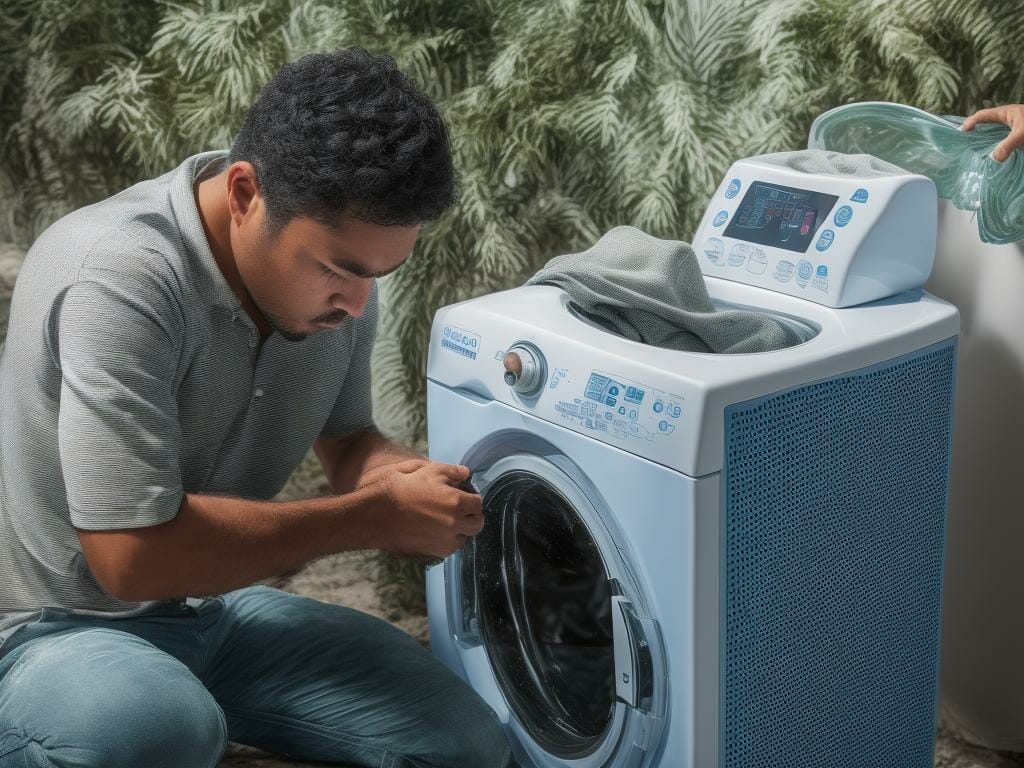
Washer Not Starting or Powering on
If your washer is not starting or powering on, there could be a few different issues to consider.
First, check the power supply to ensure that the washer is receiving electricity. A faulty power outlet or a blown fuse could be the culprit.
Next, inspect the control panel for any signs of damage or malfunction. A faulty control panel can prevent the washer from starting.
Power Supply Issues
When troubleshooting power supply issues with your portable washer, don’t forget to check the outlet and power cord for any signs of damage. A power outage or a faulty power cord can often be the culprit behind your washer not starting or powering on. Here are a few things to consider:
Faulty Control Panel
To fix a faulty control panel on your portable washer, try resetting it by unplugging the washer for a few minutes and then plugging it back in. If resetting doesn’t work, there may be other issues with the control panel that require further troubleshooting. Here are some control panel repair tips to help you identify and address the problem:
| Common Problems | Possible Solutions |
|---|---|
| Buttons not responding | Check for loose connections and ensure the buttons are not stuck or damaged. If necessary, replace the control panel. |
| Display not working | Verify that the power supply is functioning properly and check for any loose connections. If the display still doesn’t work, consider replacing the control panel. |
| Error codes displayed | Consult the user manual for the corresponding error codes and follow the recommended troubleshooting steps. If the issue persists, contact customer support for further assistance. |
Motor Malfunction
To address a motor malfunction, you should check for any loose connections and make sure the motor is not overheating.
Start by inspecting the wiring connections to ensure they are securely attached. Tighten any loose connections using a screwdriver if necessary.
Next, check the motor for signs of overheating, such as a burning smell or excessive heat. If the motor is overheating, allow it to cool down before attempting to use the washer again.
If the motor continues to malfunction, it may need to be replaced. Look for any abnormal motor noises, such as grinding or screeching, as this could indicate a more serious issue.
In this case, it is recommended to contact a professional for motor replacement.
Poor Cleaning Performance
If the clothes aren’t coming out clean, it could be due to an issue with the detergent or water temperature.
When your clothes aren’t as clean as expected after a wash cycle, it’s crucial to troubleshoot the problem to ensure optimal cleaning performance. One common cause of poor cleaning performance is the use of improper detergent. Using the wrong type or quantity of detergent can result in residue buildup on your clothes, leaving them feeling less clean.
Another potential issue could be clogged spray nozzles. Over time, mineral deposits or debris can accumulate in the spray nozzles, preventing water from effectively reaching your clothes. Regularly cleaning and unclogging the spray nozzles can help improve cleaning performance and ensure your clothes come out fresh and clean.
Excessive Vibrations During Operation
If you’re experiencing excessive vibrations during operation, don’t worry – there are ways to reduce them and bring back the smoothness of your portable washer. Balancing techniques can help stabilize the machine and minimize vibrations.
Here are some tips to get you started:
Issues With Draining Water From the Washer
Having trouble with draining water from your washer?
One common issue that can cause this problem is a clogged drain pump. The drain pump is responsible for removing water from the washer during the drain cycle. If it becomes clogged, water may not be able to flow out properly, resulting in the water not draining from the washer.
To troubleshoot this issue, you can start by checking for any visible debris or blockages in the drain pump. Use a flashlight to inspect the pump and remove any debris if necessary. If the pump appears to be clear, the issue may be with the pump motor or impeller. In such cases, it is recommended to contact a professional technician for further assistance.
Additionally, a noisy spin cycle can also be a sign of a malfunctioning drain pump, so it is essential to address this problem promptly to avoid further damage.
Frequently Asked Questions
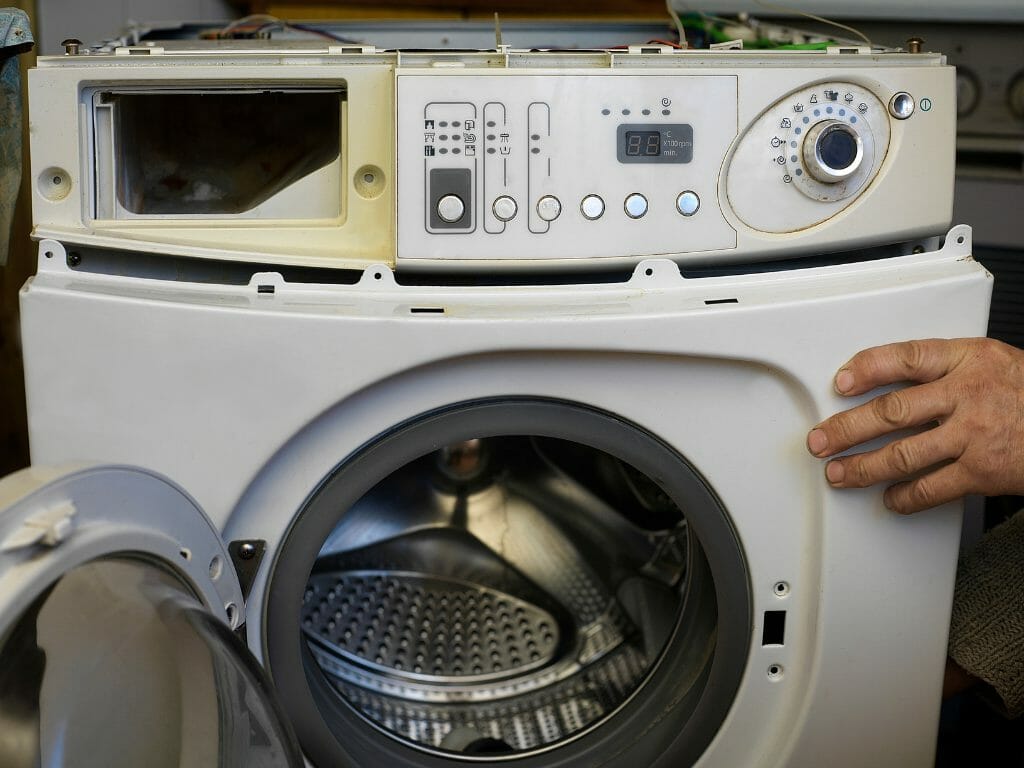
How Do I Prevent My Portable Washer From Smelling Bad?
To prevent your portable washer from smelling bad, make sure to regularly clean it and remove any excess water. Additionally, leave the door or lid open after each use to allow for proper ventilation and prevent mold growth.
Can I Wash Delicate Items in a Portable Washer?
Yes, you can wash delicate items in a portable washer. However, it’s important to consider the capacity of your washer and use appropriate settings to ensure gentle treatment and avoid damage.
What Should I Do if My Portable Washer Is Not Spinning Properly?
If your portable washer isn’t spinning properly, don’t panic! First, check for any troubleshooting portable washer leaks or clogs. Next, ensure that the drain is not blocked. Follow these steps, and you’ll be back to clean clothes in no time!
Is It Normal for a Portable Washer to Make Loud Noises During Operation?
It is not normal for a portable washer to make loud noises during operation. If you are experiencing this issue, there may be a problem with the motor or the drum. Troubleshooting portable washer noise is important for optimal performance.
How Often Should I Clean the Filters in My Portable Washer?
To ensure optimal performance and extend the lifespan of your portable washer, it is important to clean the filters regularly. By doing so, you can prevent clogs and maintain the efficiency of the machine.
Conclusion
In conclusion, troubleshooting common portable washer problems requires a keen eye for detail and a methodical approach. Just like a skilled detective, you must decipher error codes and understand their meanings to solve the mystery of malfunctioning washers.
Leaking water signifies the need for meticulous inspection and potential repairs. When your washer refuses to start or power on, it’s like a heart refusing to beat, and you must revive it with expert troubleshooting.
Achieving optimal cleaning performance requires precision and attention to detail, ensuring every garment is spotless. Excessive vibrations during operation indicate a need for balance and stability, just as in life.
Lastly, draining issues symbolize the importance of letting go and releasing the old to make way for the new. Remember, with patience and technical expertise; you can conquer any portable washer problem and achieve laundry bliss.

